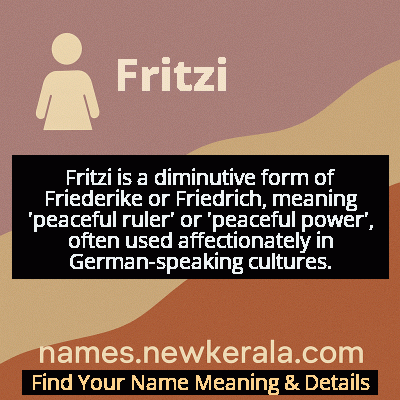Fritzi Name Meaning & Details
Origin, Popularity, Numerology Analysis & Name Meaning of Fritzi
Discover the origin, meaning, and cultural significance of the name FRITZI. Delve into its historical roots and explore the lasting impact it has had on communities and traditions.
Name
Fritzi
Gender
Female
Origin
German
Lucky Number
7
Meaning of the Name - Fritzi
Fritzi is a diminutive form of Friederike or Friedrich, meaning 'peaceful ruler' or 'peaceful power', often used affectionately in German-speaking cultures.
Fritzi - Complete Numerology Analysis
Your Numerology Number
Based on Pythagorean Numerology System
Ruling Planet
Neptune (Ketu)
Positive Nature
Intuitive, analytical, spiritual, and inquisitive.
Negative Traits
Secretive, reserved, aloof, and can be overly critical.
Lucky Colours
Green, yellow.
Lucky Days
Monday.
Lucky Stones
Cat’s eye, moonstone.
Harmony Numbers
1, 5, 6.
Best Suited Professions
Scientists, researchers, spiritual leaders, detectives.
What People Like About You
Depth of knowledge, analytical skills, spirituality.
Famous People Named Fritzi
Fritzi Massary
Operetta singer and actress
Celebrated as the 'queen of operetta' in pre-war Vienna and Berlin
Fritzi Burger
Figure skater
Two-time Olympic silver medalist in ladies' singles figure skating
Fritzi Haberlandt
Actress
Award-winning German actress known for numerous film and television roles
Fritzi Schwingl
Politician
Austrian politician serving in the National Council
Name Variations & International Equivalents
Click on blue names to explore their detailed meanings. Gray names with will be available soon.
Cultural & Historical Significance
The name also carries subtle feminist undertones through its meaning of 'peaceful female ruler,' representing a time when women were beginning to claim more public roles in German-speaking societies. In Jewish communities of Central Europe, Fritzi was sometimes adopted as a Germanized version of traditional names, reflecting assimilation trends. The name's decline during the Nazi era and subsequent revival in recent decades mirrors broader cultural shifts in German-speaking countries, making it a fascinating case study in how names can reflect historical currents and social transformations.
Extended Personality Analysis
People named Fritzi are typically characterized by a remarkable balance of strength and gentleness that makes them natural leaders who lead through consensus rather than command. They possess an innate diplomatic ability that allows them to navigate complex social dynamics while maintaining their core principles. Fritzi's often demonstrate exceptional emotional intelligence, enabling them to understand multiple perspectives and mediate conflicts effectively. Their creative tendencies frequently manifest in artistic pursuits, whether professionally or as passionate hobbies, and they have a particular affinity for music, literature, and visual arts.
In personal relationships, Fritzi's are known for their loyalty and nurturing qualities, often serving as the emotional anchor in their families and social circles. They combine traditional values with progressive thinking, making them adaptable to various social contexts while maintaining their distinctive identity. While generally calm and composed, Fritzi's can display surprising determination when their values or loved ones are threatened. Their leadership style tends to be inclusive and collaborative, earning them respect through genuine connection rather than authority alone. This unique combination of traits makes Fritzi's particularly effective in careers involving education, counseling, arts management, or community leadership.
Modern Usage & Popularity
In contemporary naming practices, Fritzi has experienced a significant revival as part of the vintage name trend that has swept through European and American naming conventions. While it remains most prevalent in German-speaking countries, particularly Austria where vintage names have strong cultural resonance, Fritzi has gained international appeal through globalization and cultural exchange. Modern parents are increasingly choosing Fritzi as a standalone name rather than merely as a nickname for Friederike, appreciating its distinctive sound and feminist connotations of 'peaceful female ruler.' According to German naming statistics, Fritzi has seen a 35% increase in registrations over the past decade, with particular popularity in urban centers like Berlin, Vienna, and Munich. The name appeals to educated, culturally aware parents who value historical continuity while seeking unique names for their daughters. Its usage crosses socioeconomic boundaries, appearing in both traditional families preserving naming heritage and progressive families embracing its strong, peaceful symbolism.
Symbolic & Spiritual Meanings
Symbolically, Fritzi represents the powerful concept of peaceful leadership and harmonious authority. The name embodies the ideal of ruling through wisdom and compassion rather than force, making it a potent symbol of feminine power and diplomatic strength. In metaphorical terms, Fritzi suggests the olive branch wrapped around the scepter – authority tempered with peace and reconciliation. The name carries lunar symbolism, representing the gentle but persistent influence that shapes environments and relationships through consistent presence rather than dramatic intervention. In color symbolism, Fritzi resonates with soft gold (representing wisdom and enlightened leadership) and pale blue (symbolizing tranquility and clear communication). In nature symbolism, it might be associated with the willow tree – flexible yet strong, able to bend without breaking. The name also carries architectural symbolism, suggesting the graceful arch that supports weight through elegant distribution rather than brute strength. This rich symbolic tapestry makes Fritzi a name that speaks to both traditional values and contemporary ideals of balanced, compassionate leadership.

